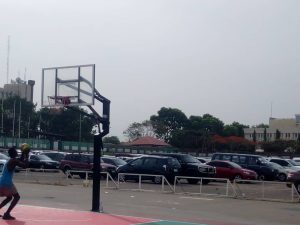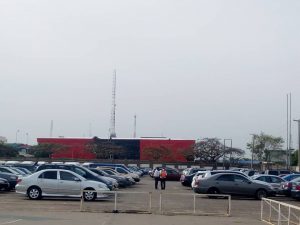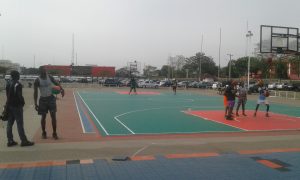Featured
Military Unlawful Takes Over Area 10 Sports Ground, Disrupts Sporting Activities

Military Unlawful Takes Over Area 10 Sports Ground, Disrupts Sporting Activities
Joel Ajayi
The Area 10 Sports Ground, the only sporting complex in the Federal Capital Territory where Athletes train ahead of their participation at major tournaments has been unlawful takes over by the Nigerian Army, Nigerian Airforce and Nigeria Navy.
Area 10 Sports Ground recently have been converted to their parking lot which is affecting the growth and development of the game in the country’s capital city.


The Spacealso serves as a source of generating revenue for the sports department as events like Trade Fair and other activities takes place there.
But the Nigeria military which office is located adjacent to the Sports Center saw the place as a comfortable and spacious place for their personals to park their cars sought the permission of the then Director of Sports to allow them use the space on a temporary note. The Director obliged them by given them a provisional approval pending when they would be able to get a permanent place.
This was how the relationship between the Sports Department of the Federal Capital Territory and the Nigeria Army began. But gradually the volume of vehicle parked on the ground by the military began to affect the activities of the Sports Department which then resulted to asking them to leave, but when the military refused the Sports department had no other option but to lock them out.


In sharp reaction by that the military who were in desperate need of a space for their personnel to park their vehicles forcefully moved over to the other wing of the Sporting center, stationing their men on the gate to chase off any person considered to be an intruder. The matter got so bad to the extent that the military even refused entry those who had paid for the space to hold their trade fair.
Every efforts by the sports department through the office of the Social Development to make the military see reasons that the ground belongs to them has fallen on deaf ear.
Our investigation revealed that as a way of solving the matter diplomatically, the issue was reported to the FCT minister, Mohammed Bello who surprisingly is not showing any concern about it and has so far done nothing about the situation, a situation that may lead to the final takeover of the ground by the military, and should that happen, sports development in the FCT will greatly be affected.
Featured
Resetting the Frontlines: Army Undergoes Rejuvenation Under Lt. Gen Shaibu’s Command

- …Intelligence-led warfare, troop welfare take centre stage
- …Discipline, welfare, accountability define new era
- …As sustained operations weaken terrorists, restore confidence
By Ibukunoluwa Adedeji
When Lt-Gen. Waidi Shaibu assumed office as the 25th Chief of Army Staff (COAS) on 30 October 2025, Nigeria faced an array of security challenges: insurgency in the North-East, banditry and kidnappings in the North-West, communal violence in the North-Central, and separatist tensions in the South-East. Troops were overstretched, public confidence was fragile, and adversaries were increasingly adaptive.
Yet within his first 100 days, Shaibu delivered renewed direction, restored confidence, and a reinvigorated operational posture. His leadership has begun to reshape both the internal culture of the Army and its external engagement with a nation hungry for stability.
From the outset, Shaibu emphasised leadership by presence. He undertook early and frequent visits to frontline formations, engaging directly with troops and commanders, inspecting bases, and holding candid discussions about operational realities. During one such visit, he reminded soldiers that “failure is not an option” and that the Army must “take the fight to the enemy and sustain the pressure”. For personnel operating under austere conditions, this visible command style carried symbolic and practical weight, signalling both accountability and support.
Within the ranks, these engagements have been interpreted as a reassertion of professionalism, initiative, and discipline at every level of command. Morale, strained by years of protracted internal security operations, has shown early signs of recovery.
Rather than pursue sweeping doctrinal changes, Shaibu has focused on tightening existing operations, closing gaps, and enforcing discipline. Commanders have been directed to prioritise sustained pressure over episodic offensives, denying armed groups freedom of movement, disrupting their logistics networks, and degrading command structures. This approach reflects an understanding that Nigeria’s threats are fragmented and mobile, and that lasting gains depend less on dramatic victories than on persistent control of contested spaces.
Central to this recalibration is the emphasis on intelligence-led operations. By urging formations to reduce predictability and adapt tactics to evolving threats, Shaibu has reinforced flexibility and responsiveness, particularly in theatres where adversaries exploit terrain, local vulnerabilities, and intelligence gaps.
Perhaps the most widely welcomed dimension of Shaibu’s early tenure has been his candour about logistics and welfare challenges. He has openly acknowledged equipment shortages, maintenance backlogs, and inefficiencies in supply chains — issues often underplayed at senior command levels. “You cannot demand excellence from soldiers without giving them the tools to succeed,” he told troops during one engagement.
Although such systemic problems cannot be resolved quickly, the early prioritisation of welfare and sustainment has resonated strongly across the ranks. It has reinforced the principle that discipline and performance thrive where leadership invests in people as much as platforms.
Shaibu has also been unequivocal in reaffirming professionalism and discipline as non-negotiable pillars of Army conduct. Troops have been reminded to adhere strictly to rules of engagement and to protect civilians, particularly in complex internal security environments where the distinction between combatant and non-combatant is often blurred. “Operational success and public trust are inseparable,” he has said, underscoring that legitimacy and restraint are as critical as kinetic force in modern conflict.
Civil–military relations and strategic communication have likewise received renewed attention. Under his leadership, the Army has sought to balance operational secrecy with transparency, explaining actions affecting civilians and reinforcing the reality that contemporary conflicts are fought as much in the court of public opinion as on the battlefield.
While his tenure remains young, early operational dividends are emerging. Dr Sani Abubakar, military scholar and publisher of OurNigeria News Magazine, describes Shaibu’s leadership as “reassuring and energising”, citing his combat credibility, operational boldness, and focus on troop welfare. According to Abubakar, Shaibu’s philosophy centres on sustained dominance of the battlespace, intelligence-led targeting, and uncompromising control of reclaimed terrain — principles vital to breaking cycles of retreat and resurgence by armed groups.
He notes that numerous terrorist elements have been neutralised under this approach, while others, weakened by sustained pressure, have surrendered. Equally significant, Abubakar observes, is Shaibu’s emphasis on sound administration. Fairness and transparency in postings and appointments are gradually restoring confidence within the officer corps and rank and file, addressing long-standing concerns about morale, meritocracy, and institutional trust.
Reflecting on Shaibu’s career, Abubakar describes him as “a thoroughbred, no-nonsense officer who led from the front and was unflinching in confronting Boko Haram terrorists”. His insistence on integrity, accountability, and merit-based leadership, he argues, is grounded in experience at every level of command and now shapes the tone of the Army’s senior leadership.
At the 100-day mark, Shaibu’s tenure is defined more by direction than dramatic outcomes — a reality seasoned analysts regard as realistic and prudent. Nigeria’s vast terrain, multiplicity of threats, intelligence gaps, and enduring resource constraints mean that no leader can deliver transformative security outcomes overnight.
Nevertheless, the gains are tangible. Operational coherence has improved, morale has lifted, and public confidence, though cautious, has begun to recover. The focus on sustained operations, intelligence-driven targeting, troop welfare, professionalism, and accountability represents a recalibration towards durability rather than spectacle.
Abubakar, while commending these advances, advocates deeper investment in human intelligence, expanded use of unmanned aerial vehicles, and sustained commitment to security sector governance reforms as essential for long-term efficiency and professionalism.
Beyond operational metrics, one of Shaibu’s most significant achievements lies in restoring institutional confidence. Among officers and soldiers, his leadership style — marked by visibility, firmness, and empathy — has reinforced the belief that competence, integrity, and merit are once again ascendant values within the Nigerian Army.
Among communities affected by violence, his emphasis on civilian protection, transparency, and professionalism has begun to reframe perceptions of the military from a distant security force to a responsive national institution committed to safeguarding lives and livelihoods. For political leaders and security stakeholders, his early tenure has provided reassurance that Army leadership understands both the complexity of Nigeria’s security challenges and the necessity of sustained, coordinated responses rather than episodic reactions.
Ultimately, Shaibu’s success will be measured not by early momentum but by enduring outcomes: fewer attacks, safer communities, and restored public confidence in the state’s capacity to protect its citizens. Troops will judge whether leadership intent continues to be matched by resources, reforms, and consistent follow-through.
What is already clear, however, is that Lt-Gen. Waidi Shaibu has reset the tone at the top of Nigeria’s Army. Through leadership by presence, operational discipline, attention to troop welfare, and an unambiguous commitment to professionalism and accountability, he has laid the foundations for sustained institutional recovery.
In a security environment where patience is scarce and pressure relentless, these early gains matter. They suggest that under Shaibu’s stewardship, the Nigerian Army is not merely reacting to threats, but regaining the initiative, and crucially, the confidence needed to confront Nigeria’s most persistent security challenges with resolve, coherence, and credibility.
-

 Featured7 years ago
Featured7 years agoLampard Names New Chelsea Manager
-

 Featured6 years ago
Featured6 years agoFG To Extends Lockdown In FCT, Lagos Ogun states For 7days
-

 Featured6 years ago
Featured6 years agoChildren Custody: Court Adjourns Mike Ezuruonye, Wife’s Case To April 7
-

 Featured7 years ago
Featured7 years agoNYSC Dismisses Report Of DG’s Plan To Islamize Benue Orientation Camp
-

 Featured4 years ago
Featured4 years agoTransfer Saga: How Mikel Obi Refused to compensate me After I Linked Him Worth $4m Deal In Kuwait SC – Okafor
-
Sports3 years ago
TINUBU LAMBAST DELE MOMODU
-

 News1 year ago
News1 year agoZulu to Super Eagles B team, President Tinubu is happy with you
-
Featured6 years ago
Board urges FG to establish one-stop rehabilitation centres in 6 geopolitical zones


